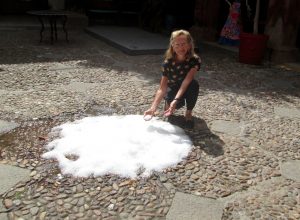This week my friend Amparo Llanos in Sydney, Australia, posted a video on Facebook that got me thinking about a number of things.
First, that she and I have been friends for more than twenty years, although we’ve never met. We’ve been corresponding since I was in the Peace Corps in Gabon and she worked for the environmental nongovernmental organization Clean Up the World based in Australia.
At that time our correspondence took weeks to travel back and forth across the oceans. (She was helping me organize the first Clean Up effort in my town of Lastoursville in the middle of Gabon’s thick rainforest, which I later wrote about in my Peace Corps memoir.) Now, Amparo and I are friends on Facebook and our missives are instantaneous.
Times – and technology – have, of course, changed; but we haven’t. Our sensibilities remain pretty much the same.
Maybe that’s why she knew I would appreciate the YouTube video she posted this week of American comedian George Carlin’s stand-up act, “The American Dream.”
This three-minute video, which has received nearly six million views, is not new — after all, Carlin died over ten years ago — and I may have even seen it before. But I found it bears re-viewing.
I was especially inclined to watch it because Amparo had commented at the top of her post, “Critical thinking? Many don’t know what it means.”
This was a teaser for me. Clearly Carlin, with his characteristic biting humor, would have something to say on the matter. But first, my mind flew back to the time when I taught critical thinking in my Freshman English classes at UNM-Taos for ten years.
“What does the ‘critical’ in critical thinking mean?” I’d ask my students at the beginning of each semester, then, not waiting for an answer, follow my question quickly by, “Does it mean being critical of everything? Fault-finding left and right?”
I’d scan the room filled with blank faces, left to right, then proceed:
“Not at all! This ‘critical’ means extremely important, as in, ‘It’s critical that we find ways to clean up the world’s oceans of plastic and garbage.’
I saw a few lights go on behind some eyes.
“Critical thinking is the act of evaluating an issue in order to form an intelligent, informed judgment,” I’d say professorially. “And this act isn’t easy. It requires hard work – thinking! – and wide reading, the kind of reading assigned in college courses that you’d be unlikely to do on your own just for fun.”
These words were not met with cheers or smiles, I could plainly see.
“Look,” I’d go on, “it’s not my job to tell you WHAT to think, but it is my job to teach you HOW TO LEARN TO THINK – and you do that by reading. In college – especially in college English classes – reading, writing, and discussing are requirements for learning. This is the purpose of higher learning – to teach critical thinking that will guide you throughout life.”
Snapping back to the present, I watched Carlin’s video.
In it he paces the stage like a bent and grumpy old man, gripping his hand-held microphone and ranting (but with good reason): “The real owners of this country [which have of late been labelled the top one percent] don’t want a population of citizens capable of critical thinking! What they want is obedient, unquestioning workers. … They don’t give a [damn] about you!”
Carlin’s parting words: “They call it ‘the American Dream’ because you have to be asleep to believe it.”
(Here’s the link: https://www.youtube.com/watch?v=acLW1vFO-2Q )
Need I point out that the bulk of Donald Trump’s most loyal and unquestioning base is comprised of the non-college-educated? And Donald Trump, the purported leader of the free world, could well be reelected if more voting-age U.S. citizens don’t wake up and think?
I’m sure there are many progressive high schools in the U.S. where critical thinking is taught. And I’m just as sure there are plenty of narrow-gauge colleges where it’s not taught. The critical thing, in my opinion, is that all people, but especially young people, learn how to use their own minds for the world’s good before it’s too late.

